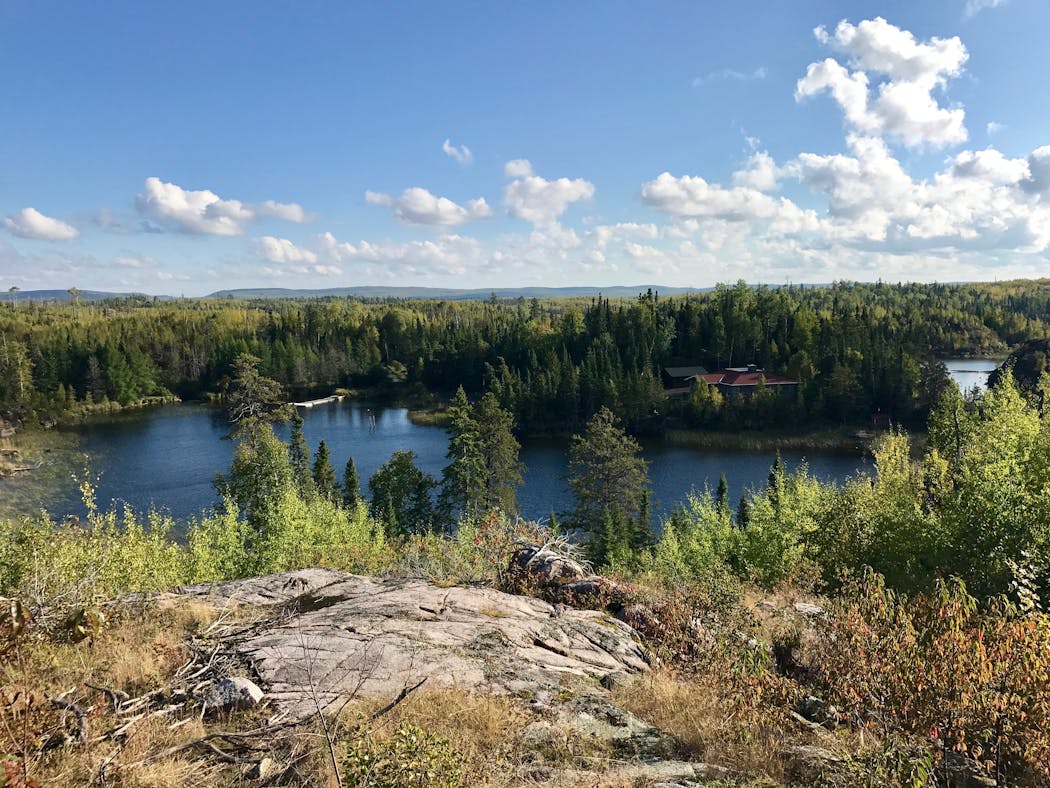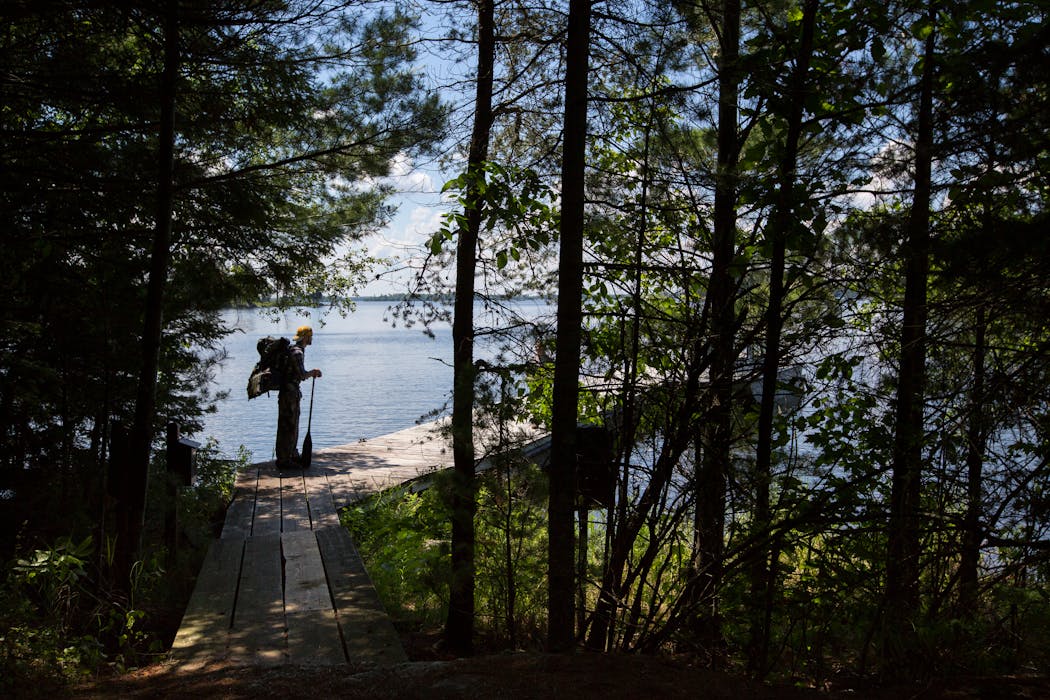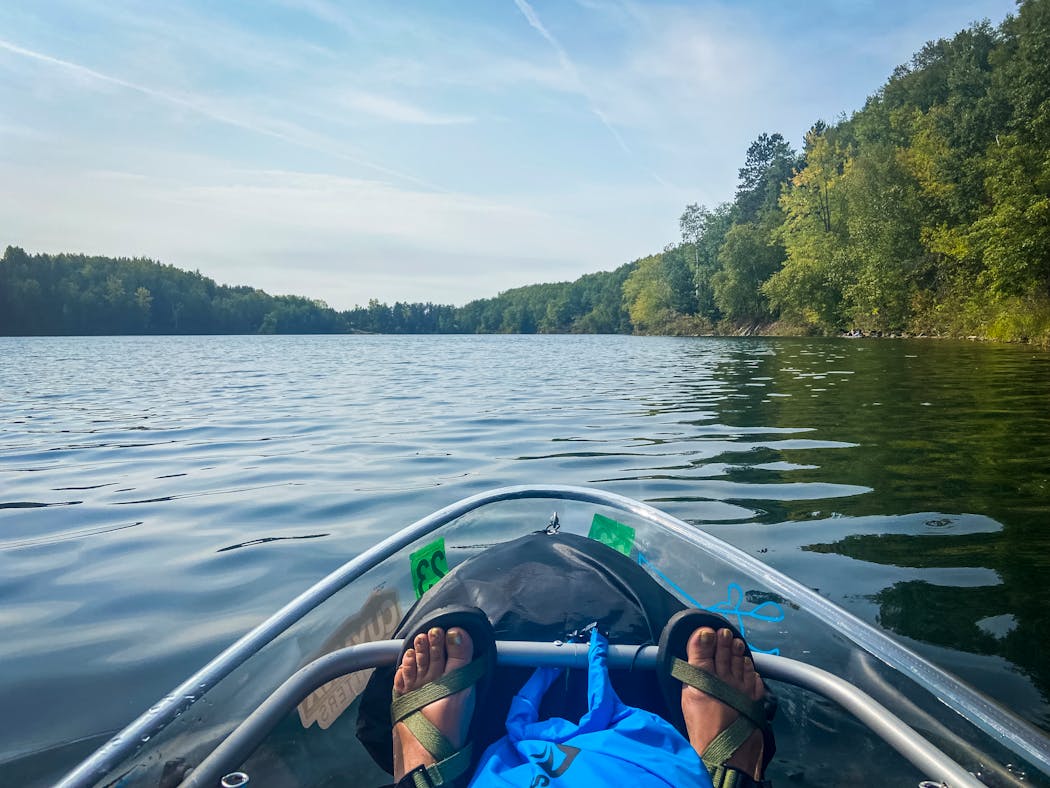With fewer permits in 2022, here are some worthy alternatives to the BWCA
With pristine lakes, ancient rock rising from shorelines and a rugged sense of solitude, the Boundary Waters Canoe Area Wilderness has been a national and international favorite for paddling getaways.
Unfortunately, the BWCA's pandemic-era popularity led to a surge in damage as some visitors left behind trash, cut down trees, partied loudly or otherwise violated the wilderness code of "leave no trace." That's why officials from Superior National Forest, which includes the Boundary Waters' 1 million acres, decided to cut back the number of user permits for 2022, by 13%.
That means whittling 285 daily permits down to 248 and a potential for 23,000 fewer visitors to the BWCA this year. Up to nine people can use a permit, which dictates where a group can enter the wilderness and how long paddlers can stay.
"[The BWCA] is on a lot of people's bucket lists," said Joanna Gilkenson, public affairs specialist for Superior National Forest, but she adds that similar scenery, portaging routes and sometimes more privacy can be found just outside the official wilderness area. "There are lots of opportunities for people who can't get a permit or need more flexibility and who want solitude and quiet outdoor experiences."
Here are some tips for navigating a tighter Boundary Waters in 2022 — and where else you can go if you crave a BWCA-like experience. (Whatever you do, after this very wet spring you should verify conditions with outfitters or ranger stations within a day or two of your departure.)
Have a Plan B or C for BWCA
Prime weekends and popular locations get reserved the fastest. If you have a group planning to go, make sure you have backup dates and alternative launch locations. Aim for midweek departures if possible.
Dozens of outfitters clustered near Ely or Grand Marais, Minn., can offer advice on alternative entry points into the BWCA, as well as providing canoes, supplies and gear. This greatly reduces prep time while also offering expert advice.
Many outfitters are connected to resorts, so you can bookend a canoe trip with a warm, dry bed. You can even make day trips to BWCA lakes, trails, overlooks and waterfalls from resorts such as Clearwater Historic Lodge on the Gunflint Trail, or Moose Track Adventures near Ely.
"Flexibility is key for those who really want a wilderness canoe trip," said Eva Sebesta, executive director of the Ely Chamber of Commerce. "Our area outfitters can offer some great trip options based on permit availability. We encourage those considering a trip outside of the BWCA to contact area outfitters, too."
Focus on the Forest
On that note: Just outside the BWCA, the 3-milion-acre Superior National Forest has 252 lesser-known backcountry sites requiring a canoe or a hike to reach them. Many have more privacy than the Boundary Waters, Gilkenson said.
Some national forest destinations feature their own paddling routes. Twin Lakes Canoe Route, 26 miles north of Grand Marais, has six lakes with four portages plus five backcountry campsites requiring no permit. The Circle Route, northeast of Ely, connects 10 lakes and two rivers.
More than a dozen small, rustic national forest campgrounds require no fees or reservations, such as Hogback Lake between Tofte and Isabelle. The three-site campground connects to five miles of trails across Hogback Ridge, with views of six lakes. The Forest Service also allows dispersed camping, which is pitching a tent wherever you can find an open spot in the backcountry.
Close to two dozen reservable campgrounds round out the national forest options. They usually include latrines, water and scattered electrical hookups. The 31-site South Kawishiwi River campground south of Ely and the 32-site Trail's End at the terminus of the Gunflint Trail both sit on the cusp of the BWCA — making them ideal base camps for day paddles.
Reservations, campsite photos and maps can be found at recreation.gov. Maps are key when heading into remote areas away from cellular service.
Venture into Voyageurs
National parks are getting more love than ever these days, but the 218,000-acre Voyageurs National Park, stretching 55 miles along the U.S-Canadian border on the west side of the BWCA, ranks among the country's least visited. That makes it possible to find privacy, despite the motorized boats and houseboats that might putter by the 147 shoreline campsites (aka "frontcountry sites"), which are accessible only by watercraft on four sprawling lakes.
Anyone yearning for more remoteness can reserve one of 15 backcountry campsites on the Kabetogama Peninsula. Backcountry campers do have to rent park canoes for use on inland lakes to protect them from invasive species (nps.gov/voya; recreation.gov for reservations). Voyageurs has also added two new primitive sites for backpackers along the Kab-Ash Trail.
Quiet at Quetico
On the Canadian side of the border, Quetico Provincial Park virtually doubles the Boundary Waters, with another million acres of wilderness and 2,000 lakes of its own to paddle, along with 2,200 backcountry sites. Quetico can be accessed from the Trans-Canadian Highway via International Falls or Grand Portage (have your U.S. passport plus proof of COVID-19 vaccination if you're 18 or older). If you want to car-camp with the family, Dawson's Trail Campground on the northeastern corner of Quetico offers more than 100 campsites and some walk-in sites on Pickerel Lake.
Paddling to Quetico directly from the BWCA remains unlikely, as Canada's Remote Area Border Crossing (RABC) permit has been suspended since the pandemic.
Clearly Cuyuna
For a different paddling experience and a shorter drive, Cuyuna Country State Recreation Area — more famous for its 50 miles of mountain biking trails — also has three water trails, including a 7.4-mile route. Most of the Cuyuna Lakes are former mine pits — with the deepest one (Portsmouth Mine Pit Lake) dropping to 450 feet.
These lakes claim up to 40 feet of clarity, which allows paddlers to look down on sunfish and trout swimming through submerged treetops like ghostly coral. Or you might catch sight of an old mining shaft. To expand the view and thrill factor, Cuyuna Outfitters in Crosby rents clear kayaks.
Kayakers and bikers alike can check in at the 29-site drive-in Portsmouth Campground. Campers can also choose one of four walk-in sites or reserve a yurt by Yawkey Mine Lake.
The DNR offers a handful of paddle- or boat-in campsites, as well, including Lake Vermilion's Hinsdale Island in Kabetogama State Forest, and at Lake Vermilion-Soudan Underground Mine State Park, Bear Head Lake State Park, and Glendalough State Park near Pelican Rapids (dnr.state.mn.us).
Paddle the Apostles
If the Boundary Waters is quintessential canoeing, Apostle Islands National Lakeshore is all about sea kayaking. And if the BWCA is for portaging, the Apostles, on the Wisconsin side of Lake Superior, are about the thrill of the inter-island crossing.
The national lakeshore includes 21 large and small uninhabited islands flung across 30 miles. Each island has its own character, most have at least a rustic campsite or two, and paddling is the best way to experience them. But traversing without a guide is not recommended. Major outfitters such as Trek & Trail and Lost Creek Adventures provide safety instruction and overnight tours ranging from two to seven days.
Half-day and full-day guided kayak trips to the spectacular mainland sea caves make for a great introduction (wind- and weather-permitting, of course). There are also nice sea caves on Sand and Devils islands.
Get a guide
If you still want to get into the BWCA and can't find a permit, consider a guide — especially if you're still learning skills such as purifying water, portaging, planning meals and protecting food and gear from bears. Guided tours also provide someone certified in emergency care, plus the camaraderie of new faces around the campfire. They'll also already have a permit and know the area well.
Wilderness Inquiry has made the outdoors accessible for people of every ability and experience level for more than four decades. Their four- and five-day trip options bring adults or families into the BWCA or Voyageurs.
Recal Travel, a Minnesota-based company that launched its first national tours this month, specializes in trips to remote destinations with guided breathwork, meditation, and forest bathing to recalibrate health and wellness. Recal's BWCA departures on June 9 and 14 are limited to seven people each.
Travel Editor Simon Peter Groebner contributed to this report.



